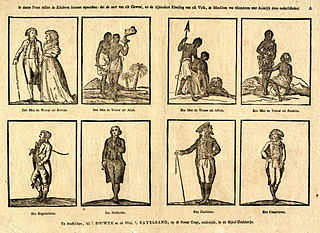Related Research Articles
Susan Tufts Fiske is the Eugene Higgins Professor of Psychology and Public Affairs in the Department of Psychology at Princeton University. She is a social psychologist known for her work on social cognition, stereotypes, and prejudice. Fiske leads the Intergroup Relations, Social Cognition, and Social Neuroscience Lab at Princeton University. Her theoretical contributions include the development of the stereotype content model, ambivalent sexism theory, power as control theory, and the continuum model of impression formation.
Shelley Elizabeth Taylor is a distinguished professor of psychology at the University of California, Los Angeles. She received her Ph.D. from Yale University, and was formerly on the faculty at Harvard University. A prolific author of books and scholarly journal articles, Taylor has long been a leading figure in two subfields related to her primary discipline of social psychology: social cognition and health psychology. Her books include The Tending Instinct and Social Cognition, the latter by Susan Fiske and Shelley Taylor.
Gideon Glick is an American actor. His Broadway work includes the role of Ernst in the musical Spring Awakening, Jimmy-6 in Spider-Man: Turn Off the Dark, Jordan Berman in Significant Other, and most recently Dill Harris in Aaron Sorkin's adaptation of Harper Lee's To Kill a Mockingbird, for which he was nominated for the Tony Award for Best Featured Actor in a Play. His film and TV work includes Ocean's 8, The Detour, Devious Maids, and Alfie in the fourth season of The Marvelous Mrs. Maisel.
In psychology, the human mind is considered to be a cognitive miser due to the tendency of humans to think and solve problems in simpler and less effortful ways rather than in more sophisticated and effortful ways, regardless of intelligence. Just as a miser seeks to avoid spending money, the human mind often seeks to avoid spending cognitive effort. The cognitive miser theory is an umbrella theory of cognition that brings together previous research on heuristics and attributional biases to explain when and why people are cognitive misers.

Admiration is a social emotion felt by observing people of competence, talent, or skill exceeding standards. Admiration facilitates social learning in groups. Admiration motivates self-improvement through learning from role-models.

In social psychology, a stereotype is a generalized belief about a particular category of people. It is an expectation that people might have about every person of a particular group. The type of expectation can vary; it can be, for example, an expectation about the group's personality, preferences, appearance or ability. Stereotypes are sometimes overgeneralized, inaccurate, and resistant to new information, but can sometimes be accurate.

Andrew Eric Gelman is an American statistician and professor of statistics and political science at Columbia University.
Ambivalent sexism is a theoretical framework which posits that sexism has two sub-components: "hostile sexism" (HS) and "benevolent sexism" (BS). Hostile sexism reflects overtly negative evaluations and stereotypes about a gender. Benevolent sexism represents evaluations of gender that may appear subjectively positive, but are actually damaging to people and gender equality more broadly. For the most part, psychologists have studied hostile forms of sexism. However, theorists using the theoretical framework of ambivalent sexism have found extensive empirical evidence for both varieties. The theory has largely been developed by social psychologists Peter Glick and Susan Fiske.
Benevolent prejudice is a superficially positive prejudice that is expressed in terms of positive beliefs and emotional responses, which are associated with hostile prejudices or result in keeping affected groups in inferior positions in society. Benevolent prejudice can be expressed towards those of different race, religion, ideology, country, sex, sexual orientation, or gender identity.
The women-are-wonderful effect is the phenomenon found in psychological and sociological research which suggests that people associate more positive attributes with women compared with men. This bias reflects an emotional bias toward women as a general case. The phrase was coined by Alice Eagly and Antonio Mladinic in 1994 after finding that both male and female participants tend to assign positive traits to women, with female participants showing a far more pronounced bias. Positive traits were assigned to men by participants of both genders, but to a far lesser degree.
Hostile prejudice is the outward expression of hate for people of a different race, religion, ideology, country, sex, sexual orientation, or gender identity. Anyone who goes against specific criteria of dress, cultural or moral beliefs, or religious or political ideologies are subject to hostile racism. This racism often leads to direct discrimination to anyone who does not fit the prejudiced person's idea of a "normal" person. This behavior is most prevalent when there are noticeable differences between ingroups and outgroups, with the outgroup members experiencing hostile prejudice from ingroup members.
In social psychology, the stereotype content model (SCM) is a model, first proposed in 2002, postulating that all group stereotypes and interpersonal impressions form along two dimensions: (1) warmth and (2) competence.

Amy Joy Casselberry Cuddy is an American social psychologist, author and speaker. She is a proponent of "power posing", a self-improvement technique whose scientific validity has been questioned. She has served as a faculty member at Rutgers University, Kellogg School of Management and Harvard Business School. Cuddy's most cited academic work involves using the stereotype content model that she helped develop to better understand the way people think about stereotyped people and groups. Though Cuddy left her tenure-track position at Harvard Business School in the spring of 2017, she continues to contribute to its executive education programs.
A conflict is a struggle and a clash of interest, opinion, or even principles. Conflict will always be found in society; as the basis of conflict may vary to be personal, racial, class, caste, political and international. Conflict may also be emotional, intellectual, and theoretical, in which case academic recognition may, or may not be, a significant motive. Intellectual conflict is a subclass of cultural conflict, a conflict that tends to grow over time due to different cultural values and beliefs.
Internalized sexism takes the form of sexist behaviors and attitudes enacted by women toward themselves or other women and girls. On a larger scale, internalized sexism falls under the broad topic of internalized oppression, which "consists of oppressive practices that continue to make the rounds even when members of the oppressor group are not present." Internalized sexism can cause a wide range of effects, for instance problems with one’s mental health and body image. Modes of internalization of sexism include early childhood inculturation and consumption of media, while language can also moderate power imbalances between groups and perpetuate internalized sexism.
The maternal wall is a term referring to stereotypes and various forms of discrimination encountered by working mothers and mothers seeking employment. Women hit the maternal wall when they encounter workplace discrimination because of past, present, or future pregnancies or because they have taken one or more maternity leaves. Women may also be discriminated against when they opt for part-time or flexible work schedules. Maternal wall discrimination is not limited to childcare responsibilities. Both men and women with caregiving responsibilities, such as taking care of a sick parents or spouse, may also result in maternal wall discrimination. As such, maternal wall discrimination is also described as family responsibilities discrimination. Research suggests that the maternal wall is cemented by employer stereotypes and gender expectations.

Kay Deaux is an American social psychologist known for her pioneering research on immigration and feminist identity. Deaux is Distinguished Professor Emerita at the Department of Psychology at the Graduate Center of the City University of New York (CUNY). According to Brenda Major, Deaux's work centers on the question of how social categories affect one's psychological makeup, social behavior, and life outcomes, while emphasizing the subjectivity of people's identities and experiences and the larger social context.
In social psychology, a positive stereotype refers to a subjectively favourable belief held about a social group. Common examples of positive stereotypes are Asians with better math ability, African Americans with greater athletic ability, and women with being warmer and more communal. As opposed to negative stereotypes, positive stereotypes represent a "positive" evaluation of a group that typically signals an advantage over another group. As such, positive stereotypes may be considered a form of compliment or praise. However, positive stereotypes can have a positive or negative effect on targets of positive stereotypes. The positive or negative influence of positive stereotypes on targets depends on three factors: (1) how the positive stereotype is stated, (2) who is stating the positive stereotype, (3) in what culture the positive stereotype is presented.

Power posing is a controversial self-improvement technique or "life hack" in which people stand in a posture that they mentally associate with being powerful, in the hope of feeling more confident and behaving more assertively. Though the underlying science is strongly disputed, its promoters continue to argue that people can foster positive life changes simply by assuming a "powerful" or "expansive" posture for a few minutes before an interaction in which confidence is needed. One popular image of the technique in practice is that of candidates "lock[ing] themselves in bathroom stalls before job interviews to make victory V's with their arms."

Intergroup relations refers to interactions between individuals in different social groups, and to interactions taking place between the groups themselves collectively. It has long been a subject of research in social psychology, political psychology, and organizational behavior.
References
- ↑ McGlynn, David (2018-06-01). "In the #MeToo Era, Raising Boys to Be Good Guys". The New York Times. ISSN 0362-4331 . Retrieved 2023-01-18.
- ↑ Stanton, Zack (2020-11-19). "2020 Has Been Miserable. Is Extreme Masculinity to Blame?". Politico. Retrieved 2023-01-18.
- ↑ Fiske, Susan T.; Cuddy, Amy J. C.; Glick, Peter; Xu, Jun (June 2002). "A model of (often mixed) stereotype content: competence and warmth respectively follow from perceived status and competition". Journal of Personality and Social Psychology. 82 (6): 878–902. ISSN 0022-3514. PMID 12051578.
- ↑ "Glick lauded for influence on social psychology field". Lawrence University. 2022-08-08. Retrieved 2023-01-18.